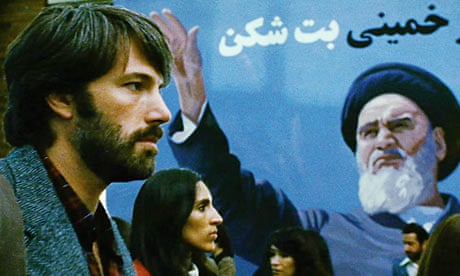In the early 20th century Baroness Orczy created Sir Percy Blakeney, the British aristocrat who, as that intrepid master of disguise the Scarlet Pimpernel, whisked noble folk away from the guillotine during the French revolution. The 1934 film version was a big success for Leslie Howard, who seven years later updated the story to the outbreak of the second world war as Pimpernel Smith, with himself as a mild-mannered Cambridge archaeologist rescuing anti-Nazi intellectuals from Hitler's Germany.
The film made him a personal target of Joseph Goebbels, and shortly thereafter the young diplomat Raoul Wallenberg saw the film at the British embassy in Stockholm and was inspired to save thousands of Hungarian Jews from Adolf Eichmann by issuing them with Swedish documents. In 1945 he was arrested by the Soviet army on their arrival in Budapest and disappeared into the Gulag never to be seen again. This story came vividly to mind this week on seeing Ben Affleck's outstanding thriller Argo, where cinema, real life and idealistic derring-do are similarly intertwined.
In 1953, the film's preface tells us, the CIA and the British secret service organised a coup d'état that toppled the legitimate Iranian prime minister Mohammed Mossadegh, who'd nationalised the oil industry. They put the Shah on the throne, backed by his vicious secret police force, Savak, which the CIA helped create. In 1979, after the regime was overthrown, the ailing Shah was given shelter in America, resulting in the storming of the US embassy in Tehran by an angry mob demanding his return home for trial and execution. The whole staff was taken hostage, an incident brilliantly recreated in the movie, mixing archive footage and new film. But six members of the consular staff, two of them women, escaped to the home of the Canadian ambassador Ken Taylor (Victor Garber), where they were sheltered as supposed personal friends, knowing they might face public execution were they caught.
At this point the CIA, having helped create the situation in the first place, stepped in with a variety of rescue plans, the least bad of which was put forward by Tony Mendez (Ben Affleck), a cool, bearded, laidback operative. He got the idea watching Escape from the Planet of the Apes with his young son. Mendez's scheme was to set up a Hollywood company and pretend that the six fugitives were Canadian film-makers scouting locations for a picture to be shot in Iran. What follows, in the deft script by screenwriter Chris Terrio, resembles an archetypal heist movie, with some borrowing from the celebrated second world war intelligence hoax "the man who never was", a plan of genius thought up by the brother of Hitchcock's pre-war producer, and later used by Hitch as the basis for North by Northwest.
Mendez recruits two old Hollywood hands, the makeup genius John Chambers (John Goodman), who designed Mr Spock's ears for Star Trek, and the veteran producer Lester Siegel (Alan Arkin) as his key collaborators. They're played by two of the cinema's great comic put-on artists, both with previous form, having appeared as outlandish producers in films with a fairly contemptuous attitude towards Hollywood (Goodman in Matinee, Arkin in Hearts of the West). They're hilarious in their combination of offhand humour, lightly worn professional pride and undemonstrative patriotism, and there's a properly disturbing contrast between their antics in Tinseltown and the six consular officers getting cabin fever in the Canadian ambassador's house.
Everything in the plan has to be made convincing – an authentic sci-fi fantasy script along fashionable Star Wars lines, news items slipped into Variety, advertising, storyboards, false cover stories for the six stranded diplomats. The team finally settle on a screenplay that sounds as outrageous as The Producers' Springtime for Hitler. It's called Argo and the conspirators take to greeting each other with the salutation "Argofuckyourself". Working against the clock ("You could teach a rhesus monkey to direct a film in a day," Siegel opines), and coping with Washington bureaucrats and cautious diplomats, they move towards the countdown stage. Mendez goes into Pimpernel mode as "Kevin Harkins", a Canadian associate producer. With only his chain-smoking to suggest his concealed anxieties about the project, he flies into Tehran. From then on it's white-knuckle, sweaty palm stuff as problems both foreseen and unanticipated arise and are confronted.
This is Affleck's third thriller as director. In the first, Gone Baby Gone, there's a benign conspiracy involving honourable public servants; in the second, The Town, a heist by likable Boston crooks. In this one he brings both situations together. And he's admirably helped by a strong cast, by the unshowy editing of William Goldenberg, and by the lighting of Mexican cinematographer Rodrigo Prieto and the production designs of Sharon Seymour. Prieto and Seymour give a distinctive feel to the different settings: the glamour of Hollywood, the dignity of the White House, the clamour of CIA headquarters, the claustrophobia of the Canadian ambassador's home, the threatening streets of Tehran under a terror that recalls the French revolution.
There are some genre clichés (the getaway car with ignition problems, the urgently ringing phone in the empty office), and annoying mistakes like the crumbling Hollywood sign to suggest an industry in crisis, despite the fact this LA icon was fully restored in 1978. But these are quibbles in a wonderfully lively and engrossing movie that includes on the soundtrack of the final credits a tribute to the participants by President Jimmy Carter, who green-lighted the rescue and whose hopes of a second term in the White House were scuppered by the hostage crisis. It could, of course, have been the voice of someone impersonating Carter.










Comments (…)
Sign in or create your Guardian account to join the discussion